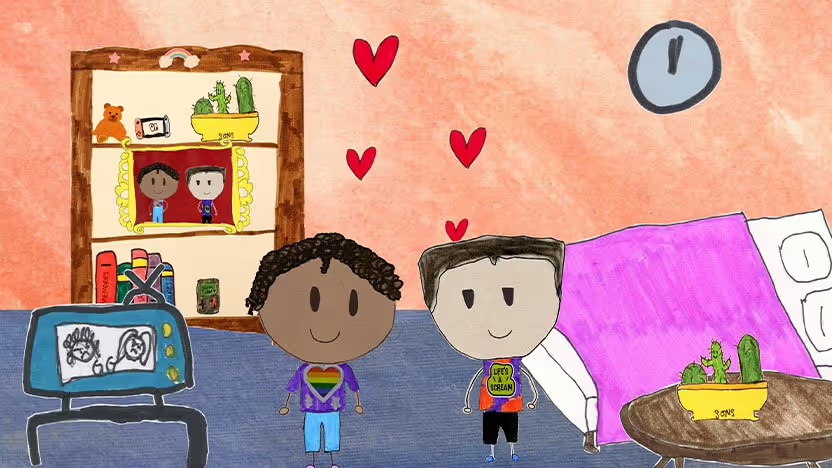To The Future, with Love Key Participants, Key Issues, & Background Information
Key Participants, Key Issues, & Background Information

Key Participants
Hunter Pixel Jimenez: 19-year-old nonbinary trans man and son of immigrant parents from Guatemla. Hunter lives in the Koreatown neighborhood of Los Angeles with his family.
Key Issues
- Trans and Nonbinary Youth
- Central American Immigrants
- Gender Binaries
- Family Relationships (Familial obligations and loyalty)
- Trans and Queer Love
- LGBTQI+ Networks
- Envisioning Futures
- First-Generation Youth
- Long-Distance and Online Relationships
- Parenting LGBTQI+ Children
Background Information
Helping the Family:
Many children of immigrants often take on tasks and responsibilities, or act as social and cultural “brokers,” to support their family (Delgado, 2020). People immigrate to the U.S. from other countries for a myriad of reasons: for job opportunities, as economic and political refugees; to avoid persecution based on their gender or sexuality; to seek health care; and for family and community networks. Children in immigrant families often become translators, primary caregivers of siblings, income earners, and legal assistants at a very young age. As immigrant parents make sense of their new social and cultural context in the United States, many rely on their children to help navigate the complexities of their new circumstances. Some research suggests that for children of immigrant families, this process of “brokering” can lead to feelings of empowerment and validation. For example, translating documents for their parents can encourage young people to maintain fluency in their parents’ first language and can reinforce a sense of pride in helping the family. At the same time, these responsibilities and commitments can lead to stress and overwhelming expectations for children of immigrants (Delgado, 2020). Oftentimes, the responsibilities are unequally distributed by gender and age, as in the cases where girls and/or the eldest children are asked to be the primary “brokers” for their families.
Queer and Trans Migrations from Central and Latin America:
There has been a long history of trans, queer, and other LGBTQI+ people immigrating to the U.S. in order to find sanctuary from abuse and persecution in their home countries. For example, the first organized Trans-Gay Migrant Caravan in 2017 established a network of trans and queer people from Central America who were seeking aslyum in the U.S. Many LGBTQI+ people from Central and Latin America make this treacherous journey in order to escape violence associated with homophobia and transphobia, sexual violence, kidnappings, forced sex work, and governmental neglect. Some LGBTQI+ people are also rejected or harmed by their immediate families because of their gender and/or sexual identity. LGBTQI+ people seek refuge in the U.S. because, despite the transphobia and homophobia that still exist, the U.S. has more established systems of support through the government, non-profits, and humanitarian organizations in comparison to their home countries.
Anti-Trans Legislation in the U.S.:
Although LGBTQI+ people enjoy some protections under federal and some state laws, other states are actively working to limit the rights and freedoms of trans and nonbinary people. In the film, Hunter mentions that Arkansas is a difficult place for trans people to live and work. In 2021, Arkansas passed two anti-trans laws, one restricting trans youth participation in sports and the other prohibiting healthcare professionals from providing or referring transgender youth for medically necessary health care. Though the health care restriction bill was blocked by a federal court, the efforts to restrict trans rights continues. In the first weeks of 2021, the governor of Arkansas proposed legislation that would make it illegal for prisons to house inmates according to their gender identity.
Arkansas is not the only state that has proposed or passed anti-trans legislation in recent years. In 2021 alone, 33 states introduced more than 100 bills aiming to limit the rights people, 17 of which were passed into law. These include “bathroom bills” that require the bathroom a person uses be determined by their sex assigned at birth; bans on transgender students participating in sports consistent with their gender identity; bans on access to gender-affirming medical care for trans people; and religious exemption laws that permit people, churches, non-profit organizations, and/or corporations to seek exemptions from providing services that burden their religious beliefs.
But the harm of anti-trans legislation extends far beyond the confines of the law itself. Such policies, even if they are not enacted, send a message that trans people are dangerous, deceptive and disposable, dehumanizing tropes that lead to increased discrimination and violence. For example, in 2021 more anti-trans laws were passed than in any previous year and this was also the most deadly year on record for trans people; with trans women of color accounting for those who were most harmed. In this way, local and state politics can compound the risk of discrimination and violence for all trans people.
Supportive Networks for LGBTQI+ People:
Despite the ever-changing legislative landscape in the U.S., LGBTQI+ people have continued to build and sustain networks of support through community groups, nonprofits, and advocacy organizations. Efforts by groups such as those in the “resources'' list below enable LGBTQI+ people to live healthier, safer, and more connected lives. Hunter invites us all to dream of a future where all LGBTQI+ people, no matter their race, class, ability, or immigration status, have all the support and care they need to thrive. These resources can support us in moving those dreams towards a reality.
